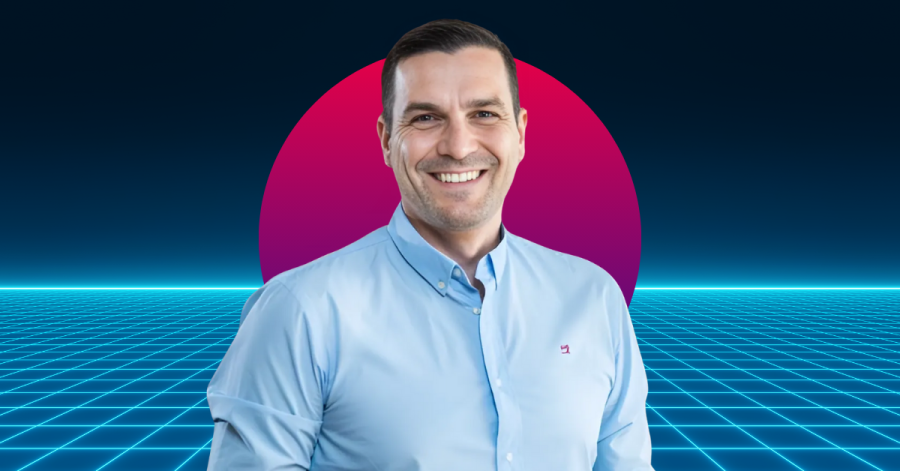Some founders don’t just build companies—they build ecosystems. Some use their personal capital to back the next generation of visionaries, placing bold bets on those who share their ambition. Others take it a step further, launching VC funds and immersing themselves in the founder’s journey from the other side of the table.
And then there are those who stay laser-focused on building. But even they, in moments of reflection, might wonder: What if I were the one writing the checks? What kind of investor would I be?
For this special series, we’re flipping the script. We’re inviting founders to step into the role of a VC investor—just for an hour. Like a reality show, but for the world of startups, we challenge them to think like a GP and answer the questions they’d typically be asked.
Today, we welcome Andrej Hájek, CEO of FLO. A global consulting leader based in the Czech Republic, Andrej specializes in digital transformation for mid-sized and large enterprises. His company, FLO, serves major clients such as Erste Group, Linet, Porsche, and Heineken. Having spent years working in Australia and the UK, he now leads FLO from his home country. Before this, he worked for Vodafone and Transport for NSW, a government agency in New South Wales, Australia. He also co-founded bluez.io, a Salesforce and Mulesoft-focused consultancy, which was later acquired by FLO.
Curious about the previous editions? Check out our conversations with Hubert Palán, founder and CEO of Productboard or Emil Muthu, founder and CEO of Neurony.
Now, let’s see how Andrej Hájek thinks like an investor.
“My primary interest would lie in AI startups operating in the finance sector, health tech, and cybersecurity.”
If you were handed a VC fund today, what would your investment thesis be? (e.g., specific industries, stages, or types of founders you’d focus on)
I would focus on both specific industries and the founders behind them. My primary interest would lie in AI startups operating in the finance sector, HealthTech, and cybersecurity—three key industries that are currently experiencing significant growth and gaining considerable momentum in the market.
Regarding founders, it’s essential to recognize their critical role in defining and executing the vision, driving growth, and ensuring stability. I would seek out highly motivated, visionary individuals who demonstrate courage, strong personal profiles, excellent communication skills, and a well-defined vision, including a potential exit strategy. These leaders should have a strong yet balanced personality, capable of inspiring confidence and steering their startups toward success.
What’s one startup idea or sector you’ve always believed in but never had the resources to explore? Would you fund it if you were a VC?
I would focus on domains that are gaining traction and generating hype but where much of their potential remains untapped—BioTech and NeuroTech being good examples. While these aren’t necessarily new fields, they hold significant promise, with many opportunities yet to be fully realized. I believe that, over the long term, these sectors have the potential for explosive growth.
“SpaceTech is my greatest passion.”
What’s the craziest or most unconventional idea you’d back?
SpaceTech is my greatest passion. It’s incredible to witness the advancements driven by SpaceX and other organizations, but I believe the field remains largely unexplored. While it requires substantial resources, I see it as one of the key directions for the future. After reaching its peak in the last century, SpaceTech is now experiencing a resurgence of interest, and I think the current political climate could further accelerate its momentum.
Imagine you could create your dream portfolio as a VC. Which three startups—anywhere in the world—would you include and why?
Although they are no longer startups, I would combine my area of passion with potential, which leads me to choose Rocket Lab, Stripe, and DeepMind.
If a founder pitched you an idea similar to your own business, what would you look for to decide whether to invest?
There are several key factors I would consider, with primary focus on the foundations of the business: the product or service and its underlying technology, the team, and the founder’s vision. It’s crucial to assess whether the vision is sustainable long-term and if the idea resonates with the market. Equally important is the early execution of the idea—how effectively it is being implemented. I would also examine the client portfolio, as it can provide valuable insights into potential challenges. A thorough review of the P&L and financials is essential to identify any underlying issues and assess their relevance to investment decisions. Finally, the founder’s role is critical, and a deep understanding of their personality, motivation, and goals is invaluable in evaluating their potential for long-term success.
Which industries or niches in CEE, in your opinion, are currently overlooked but deserve more investment?
As I mentioned earlier, HealthTech is one of the booming sectors. While there’s already a lot happening in this space, numerous opportunities for investment still exist. Additionally, so-called “boring” industries, such as manufacturing and utilities, also hold significant potential for innovation. ESG is another major area of interest. I’ve noticed a relative lack of investment in ESG initiatives here in the CEE region compared to Western countries or Australia. For example, sectors like large-scale waste management and recycling could be particularly compelling.
Are there regional startups or founders you admire that you would love to back if you were a VC? Why?
That’s a tough question for me because I’ve been based in this region for the past two years and haven’t had as much opportunity to explore the market here as I did in Australia. There, I know a few examples that really stand out. Historically, I was particularly impressed by some startups that emerged during the early stages of the digital transformation wave, especially those focused on consulting. Around 7 to 10 years ago, a brilliant idea emerged in Australia to completely revolutionize how IT projects were managed, analyzed, and executed. One standout startup was called Two Weeks. Their bold approach wasn’t necessarily the first in the industry, but it had a significant impact. They introduced an innovative model by breaking down large IT projects into smaller, two-week cycles, ensuring faster, more tangible results for clients. This method not only improved transparency and efficiency but also challenged traditional consulting practices, particularly in IT.
What’s one thing you’d do differently as a VC to support founders better?
It’s not just about the money. It’s also about providing support in leadership, particularly when it comes to scaling the business, navigating its core dynamics, and understanding how the industry operates. Venture capital brings a wealth of experience to the table, offering guidance on growth strategies, customer acquisition, and sales. These are the kinds of insights I believe founders truly value and appreciate.








